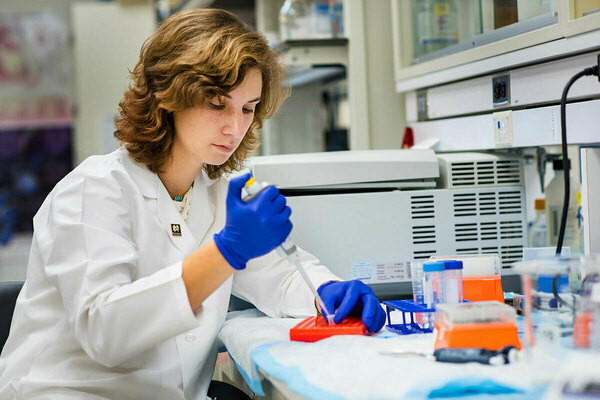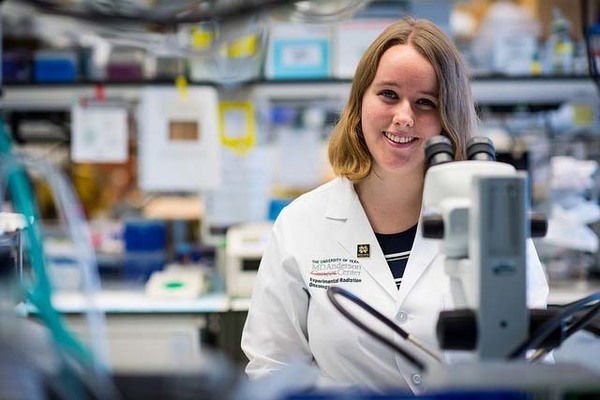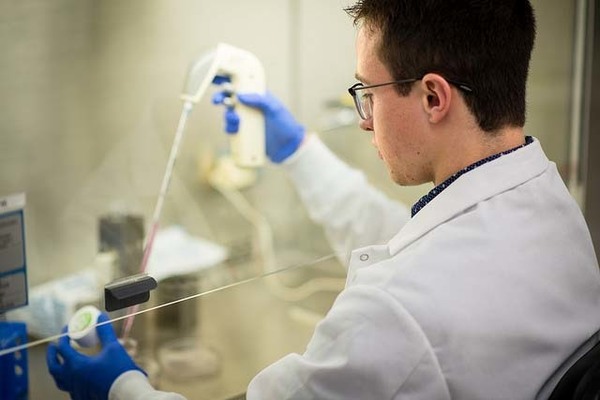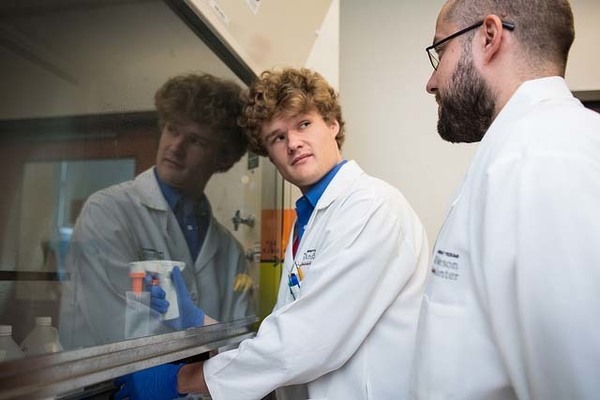
Research took precedence over relaxation for several College of Science students this summer who spent 10 weeks completing undergraduate research projects at MD Anderson Cancer Center in Houston, Texas.
The University of Notre Dame Summer Undergraduate Research Program at MD Anderson is a competitive program designed for outstanding and highly motivated undergraduate students interested in pursuing a career in cancer research. Students participated in various types of research in different labs, attended lectures and presentations, and collaborated with others as they fostered their interest in a research career path.
“Students here had the experience of being both involved in cutting-edge research while working on a large, major metropolitan campus,” said Dominic Chaloner, former undergraduate research coordinator who has taken the position of director of undergraduate studies for Environmental Sciences. Xuemin (Sheryl) Lu was named undergraduate research coordinator in August.
 Sarah Herzog
Sarah Herzog
Sarah Herzog, a senior majoring in biochemistry, researched experimental radiation oncology in early-stage breast cancer, evaluating the correlation between an immune checkpoint marker and aggressive tumor behavior.
“For the first time I was given background, what I’d be studying, and was told, ‘figure out the best way to measure this,” Herzog says. “The whole thing has been a new adventure for me, thinking about what information I am missing and how I can make it better. It has given me the chance to put the skills ND has given me to the test—am I ready to be a researcher?”
Colin Sheehan, a junior biological sciences major who worked in the Department of Cancer Systems Imaging at MD Anderson, studied how to create a small molecular probe that could improve the diagnosis of glaucoma, a common degenerative eye disease. Though there are several diagnostic tests for glaucoma, none directly measure the underlying cellular process of the disease, Sheehan said. The molecular probe addressed that issue because it’s activated by a specific enzyme, called caspase-3, around the dying cells. Certain clinical imaging technologies can detect the activation.
Sheehan’s role was to find out why, when tested in a mouse, the probe worked well, but would sometimes activate healthy cells when tested in vitro.
 Colin Sheehan
Colin Sheehan
“Something I really enjoyed about this experience was we occasionally had these very large departmental meetings—researchers will rotate in presenting what they’re working on and the rest ask questions or offer critiques. It’s a neat opportunity to see the environment, talk to people, and learn about all the cool work happening here,” said Sheehan.
Trever Carter completed his summer research in MD Anderson’s Department of Pediatrics, studying gliobastoma multiforme. The disease is one of the most aggressive malignant types of gliomas, which are tumors that occur in the brain and spinal cord. A junior biochemistry major, Carter’s project involved testing some newly synthesized compounds’ effects on cell viability, as well as trying to discern and determine a the specific biochemical interaction through which the those compounds would work best.
“I had never done research before, so being in this aspect of science is very new and exciting,” Carter said. “We are at the junction of translational medicine, where research and clinical trials are right at the patient’s doorstep, partnered with excellent clinical care.”
Also working in the Department of Pediatrics, Melanie Justice, a junior biochemistry major, researched ways to find a novel combination therapy for high-risk pediatric rhabdomyosarcoma, a type of cancer made up of cells that normally develop into skeletal muscles.
During her work, Justice said she was inspired by seeing many different people working together to tackle a therapy for pediatric cancer. “I’ve met some of the most innovative and compassionate minds in the world of science, and I have witnessed the real-world implications of ground-breaking research.” she said. “But I am more than just a mere observer here! And that has been a truly humbling realization.”
 Katie Uhler
Katie Uhler
Katie Uhler, a senior majoring in science business, worked as a research intern in the Department of Clinical Cancer Prevention. Her research focused on a protein kinase called PTK7, which is often overexpressed in triple negative breast cancer. Triple negative breast cancer is an aggressive type that does not express any receptors, and tends to affect younger patients. In the lab, Uhler conducted experiments to determine the effect of PTK7 on the growth of triple negative breast cancer cells and identify possible target proteins of PTK7 that may contribute to disease progression.
The time she spent in a breast cancer clinic with Dr. Powel Brown, a medical doctor who also holds a Ph.D., was the highlight of Uhler’s summer. Visiting the clinic put her laboratory work into perspective. “On top of all the medical knowledge I gained, I left the clinic that day feeling humbled after interacting with so many brave women battling for their lives against breast cancer,” Uhler said. “Thanks to the work of researchers like those in Dr. Brown’s lab, many of these women will receive life-saving treatment.”
 Shane Davitt
Shane Davitt
Junior biology major Shane Davitt studied tumor-mediated immune responses in MD Anderson’s Clinical Cancer Prevention-Research Department. His research focused on the discovery of biomarkers for the diagnosis and early detection of cancer. He studied if and how cancer cells reduce the number of active T cells—a subtype of white blood cells that play a role in the immune system—that are attacking the tumor. He also looked at how tumors “hijack” the body’s normal immune processes, reducing immune responses and promoting tumor growth.
“The most valuable aspect of my time was seeing how research works in a professional setting, and I have really enjoyed working on something that matters, and that I know will be used by our lab in the future,” Davitt said.
All students who participated in summer research at MD Anderson had strong academic backgrounds, highly supportive letters of recommendation, and thoughtful and well-written personal statements, Chaloner said.
“Students who would like to land an internship at MD Anderson next summer should start thinking as soon as possible about which researcher they would like to work with at the center,” he said.
For more information, visit MD Anderson Summer Research Programs.
Originally published by at science.nd.edu on October 24, 2017.